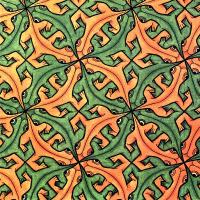Messages: 26
Language: English
Bruso (User's profile) November 16, 2013, 1:30:59 PM
For example, if I said "Mi deziras kviego!" meaning "I want absolute silence!" The back-formation being kvieta -> kvia. (I suppose the proper word would be kvietego).
Or, of course, the famous "malgraŭ" -> "graŭ". But maybe that's too well-known to be a good example. One wouldn't have to decode that one on-the-fly.
By the way, is there an established Esperanto word for "back-formation"?
sudanglo (User's profile) November 16, 2013, 2:13:07 PM
The Esperantists have a very developed sense of what is a root and what a compound. I would guess that most of the back-formations that have occurred in the language have come about through knocking off a pseudo suffix from an international borrowing.
Nile (User's profile) November 16, 2013, 3:11:32 PM
jismith1989 (User's profile) November 16, 2013, 3:16:54 PM
Nile:Like that whole feminismo>femino>femo thing.That kind of makes etymological sense too, because the standard Esperanto word for 'man' is viro which comes from the standard Latin word vir, and a standard Latin word for woman is femina (another one is mulier, from which comes, for example, Spanish mujer). That said, virina is also a Latin word, but that defeats the whole feminist idea (and the Romans definitely weren't feminists!). Obviously homo is the standard Latin word for people generally too, as in Homo sapiens.
Nile (User's profile) November 16, 2013, 3:22:13 PM
jismith1989 (User's profile) November 16, 2013, 3:30:47 PM
Nile:Yeah, I never really understood if I should use "homo" as the typical generic word for a person, but I kinda wanted to because it's shorter than persono.It seems like a good word to use! I'll try not to bore everyone by linking things with Latin too much, but whilst I'm on the subject of Latin etymology, persono obviously comes from the Latin persona, which originally meant a character in a play (or the mask that the character would wear), a bit like how we use the word persona in English still, so homo would have been the word that would have been used most often in Latin (it was only in later Medieval Latin that persona came to mean a person). But then French uses homme, and Spanish hombre, to describe a man specifically which confuses things. I guess it was just casual sexism that caused the meaning to be narrowed down to just the male sex in the descendant Romance languages (since men were the main actors in everyday life, and women were shut behind closed doors), but Esperanto seems to reclaim the old usage, which a good thing.
yyaann (User's profile) November 16, 2013, 5:21:08 PM
jismith1989 (User's profile) November 16, 2013, 5:52:25 PM
yyaann:On a somewhat related note, I remember reading somewhere that some speakers of Esperanto, especially native ones, tended to cut words exactly at the right letter to preserve their gramatical function. As an example, distanca -> dista. Can't find my source back though.Yep, that makes sense, that's called apocope (I'm sure it's called that in most European languages, since the term comes from Greek). Like French resto from restaurant, or English 'mike' from 'microphone' (or French micro for that matter). Another, slightly more nuanced, example would be the loss of the final 'o' in Spanish bueno or primero when they come before a singular masculine noun (but that's presumably for euphony, i.e. because it sounds better, rather than just for abbreviation's sake).
Those are the kind of things that, as you say, come about from use in the real world.
Bruso (User's profile) November 16, 2013, 7:39:54 PM
yyaann:On a somewhat related note, I remember reading somewhere that some speakers of Esperanto, especially native ones, tended to cut words exactly at the right letter to preserve their gramatical function. As an example, distanca -> dista. Can't find my source back though.Maybe it was the article I linked in this thread.
Bruso (User's profile) November 16, 2013, 8:34:17 PM
Bruso:By the way, is there an established Esperanto word for "back-formation"?Anyone have any ideas about this question?


